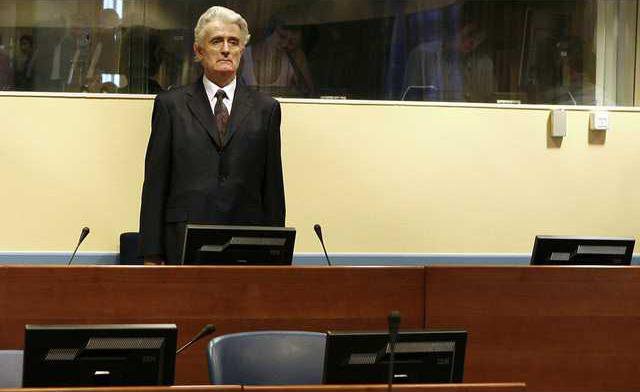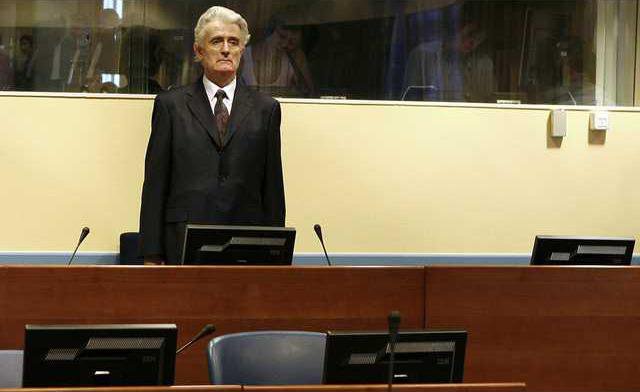THE HAGUE, Netherlands — Former Bosnian Serb leader Radovan Karadzic appeared at the U.N.’s Yugoslav war crimes tribunal for the first time Thursday, telling the judge he would defend himself against charges of genocide and crimes against humanity.
Appearing appeared older and thinner than during the Bosnian war, Karadzic had lost little of the brash defiance he repeatedly flashed in meetings with diplomats and international envoys when he was the untouchable ruler of Bosnian Serbs’ ministate during the 1992-95 war.
Karadzic, 63, claimed his arrest in Belgrade was an illegal kidnapping and refused to enter pleas to the 11 charges against him, including genocide and crimes against humanity.
He smiled when judge Alphons Orie asked him about the conditions of his detention in a U.N. cell near the court. ‘‘I’ve been in worse places,’’ he said.
And when Orie asked him if his family knew where he was being held, Karadzic replied: ‘‘I do not believe there is anyone who does not know that I am in the detention unit.’’
He claimed he cut a deal in 1996 with a U.S. negotiator to drop out of public life, apparently in return for his indictment being scrapped.
The United States dismissed the claim that negotiator Richard Holbrooke made such a deal with Karadzic, and the judge did not allow him to fully explain his version of events.
‘‘This is not the appropriate moment,’’ Orie said.
‘‘I must say that this is a matter of life and death. If Mr. Holbrooke still wants my death and regrets that there is no death sentence here, I wonder if his arm is long enough to reach me here,’’ Karadzic said before he was cut off.
In Washington, the State Department dismissed Karadzic’s comments.
‘‘The man is standing trial for war crimes. He has an opportunity to defend himself in the Hague. That is not an opportunity that was afforded to any of his victims,’’ said State Department spokesman Sean McCormack.
And in a July 26 interview with Germany’s Spiegel Online International, Holbrooke was asked about rumors that he told Karadzic if he retired from politics, he would not be sent to the war crimes tribunal.
‘‘Those are lies I do not comment on any longer,’’ Holbrooke said at the time.
Karadzic said he would act as his own lawyer — as did his mentor, former Yugoslav President Slobodan Milosevic. The move caused Milosevic’s trial to be repeatedly interrupted and delayed when Milosevic fell ill or suffered fatigue. He died in 2006 while being tried on genocide charges.
‘‘I have an invisible adviser but I have decided to represent myself,’’ Karadzic calmly told Orie.
It was his first appearance before the Yugoslav war crimes tribunal, and came just 10 days after he was arrested on a Belgrade bus after 13 years on the run from justice.
A member of Karadzic’s legal team said Karadzic will go on hunger strike if he is not allowed to defend himself in his genocide trial.
‘‘It is his basic right to defend himself,’’ lawyer Svetozar Vujacic said in Belgrade, adding that Karadzic ‘‘will insist on that even if he has to go on hunger strike.’’
Karadzic, who smiled at times during the hearing, listened intently as Orie read a summary of the indictment in which prosecutors allege Karadzic masterminded atrocities, including the Srebrenica massacre and siege of Sarajevo during the Bosnian war. The siege left an estimated 10,000 dead and prosecutors say 8,000 people were murdered in Srebrenica.
Karadzic declined to have the full indictment read to him.
‘‘I am not interested in having someone else read the indictment to me,’’ he said. ‘‘I would rather receive the new indictment that has been announced and have sufficient time to study it and then have my initial appearance for that and enter my plea.’’
Prosecutor Serge Brammertz confirmed that he was planning to amend the indictment but gave no further details.
Orie scheduled a new hearing on Aug. 29 at which Karadzic will have to enter pleas. If he does not, the court will enter not guilty pleas for him.
In the Bosnian capital, coffee bars showed Karadzic’s hearing on giant flat-screen TVs.
‘‘It’s him,’’ said Elvir Kljakic, 27, who lost his father and brother during the war. ‘‘It’s the beast. I did not believe it until now.’’
‘‘I’m happy and sad at the same time,’’ said Alena Tiro, 42. ‘‘Happy because the world seems to be not as bad as I thought so far if it forced him to the courtroom. Sad because 100,000 people he killed are not watching this.’’
In the small office of the Association of the Mothers of Srebrenica, about 20 widows watched the broadcast.
‘‘There is the trash,’’ one of them said when Karadzic appeared. Three women burst into tears.
‘‘I have not found one bone of my children yet and there he is — alive,’’ said Ramiza Music, 52, who lost two teenage sons, a husband and two brothers in the Srebrenica massacre. ‘‘Today I feel there is a bit of justice in this otherwise really pitiful world.’’
In Karadzic’s former power base of Pale, a village in mountains close to Sarajevo, his supporters doubted he would get a fair trial at the tribunal, which they believe is biased against Serbs.
Slavko Jovicic, a Serb lawmaker in the Bosnian parliament said Karadzic, is already seen as guilty, even though the trial has not started yet.
‘‘He has no chance of proving his innocence in front of this court,’’ he said.
Appearing appeared older and thinner than during the Bosnian war, Karadzic had lost little of the brash defiance he repeatedly flashed in meetings with diplomats and international envoys when he was the untouchable ruler of Bosnian Serbs’ ministate during the 1992-95 war.
Karadzic, 63, claimed his arrest in Belgrade was an illegal kidnapping and refused to enter pleas to the 11 charges against him, including genocide and crimes against humanity.
He smiled when judge Alphons Orie asked him about the conditions of his detention in a U.N. cell near the court. ‘‘I’ve been in worse places,’’ he said.
And when Orie asked him if his family knew where he was being held, Karadzic replied: ‘‘I do not believe there is anyone who does not know that I am in the detention unit.’’
He claimed he cut a deal in 1996 with a U.S. negotiator to drop out of public life, apparently in return for his indictment being scrapped.
The United States dismissed the claim that negotiator Richard Holbrooke made such a deal with Karadzic, and the judge did not allow him to fully explain his version of events.
‘‘This is not the appropriate moment,’’ Orie said.
‘‘I must say that this is a matter of life and death. If Mr. Holbrooke still wants my death and regrets that there is no death sentence here, I wonder if his arm is long enough to reach me here,’’ Karadzic said before he was cut off.
In Washington, the State Department dismissed Karadzic’s comments.
‘‘The man is standing trial for war crimes. He has an opportunity to defend himself in the Hague. That is not an opportunity that was afforded to any of his victims,’’ said State Department spokesman Sean McCormack.
And in a July 26 interview with Germany’s Spiegel Online International, Holbrooke was asked about rumors that he told Karadzic if he retired from politics, he would not be sent to the war crimes tribunal.
‘‘Those are lies I do not comment on any longer,’’ Holbrooke said at the time.
Karadzic said he would act as his own lawyer — as did his mentor, former Yugoslav President Slobodan Milosevic. The move caused Milosevic’s trial to be repeatedly interrupted and delayed when Milosevic fell ill or suffered fatigue. He died in 2006 while being tried on genocide charges.
‘‘I have an invisible adviser but I have decided to represent myself,’’ Karadzic calmly told Orie.
It was his first appearance before the Yugoslav war crimes tribunal, and came just 10 days after he was arrested on a Belgrade bus after 13 years on the run from justice.
A member of Karadzic’s legal team said Karadzic will go on hunger strike if he is not allowed to defend himself in his genocide trial.
‘‘It is his basic right to defend himself,’’ lawyer Svetozar Vujacic said in Belgrade, adding that Karadzic ‘‘will insist on that even if he has to go on hunger strike.’’
Karadzic, who smiled at times during the hearing, listened intently as Orie read a summary of the indictment in which prosecutors allege Karadzic masterminded atrocities, including the Srebrenica massacre and siege of Sarajevo during the Bosnian war. The siege left an estimated 10,000 dead and prosecutors say 8,000 people were murdered in Srebrenica.
Karadzic declined to have the full indictment read to him.
‘‘I am not interested in having someone else read the indictment to me,’’ he said. ‘‘I would rather receive the new indictment that has been announced and have sufficient time to study it and then have my initial appearance for that and enter my plea.’’
Prosecutor Serge Brammertz confirmed that he was planning to amend the indictment but gave no further details.
Orie scheduled a new hearing on Aug. 29 at which Karadzic will have to enter pleas. If he does not, the court will enter not guilty pleas for him.
In the Bosnian capital, coffee bars showed Karadzic’s hearing on giant flat-screen TVs.
‘‘It’s him,’’ said Elvir Kljakic, 27, who lost his father and brother during the war. ‘‘It’s the beast. I did not believe it until now.’’
‘‘I’m happy and sad at the same time,’’ said Alena Tiro, 42. ‘‘Happy because the world seems to be not as bad as I thought so far if it forced him to the courtroom. Sad because 100,000 people he killed are not watching this.’’
In the small office of the Association of the Mothers of Srebrenica, about 20 widows watched the broadcast.
‘‘There is the trash,’’ one of them said when Karadzic appeared. Three women burst into tears.
‘‘I have not found one bone of my children yet and there he is — alive,’’ said Ramiza Music, 52, who lost two teenage sons, a husband and two brothers in the Srebrenica massacre. ‘‘Today I feel there is a bit of justice in this otherwise really pitiful world.’’
In Karadzic’s former power base of Pale, a village in mountains close to Sarajevo, his supporters doubted he would get a fair trial at the tribunal, which they believe is biased against Serbs.
Slavko Jovicic, a Serb lawmaker in the Bosnian parliament said Karadzic, is already seen as guilty, even though the trial has not started yet.
‘‘He has no chance of proving his innocence in front of this court,’’ he said.

